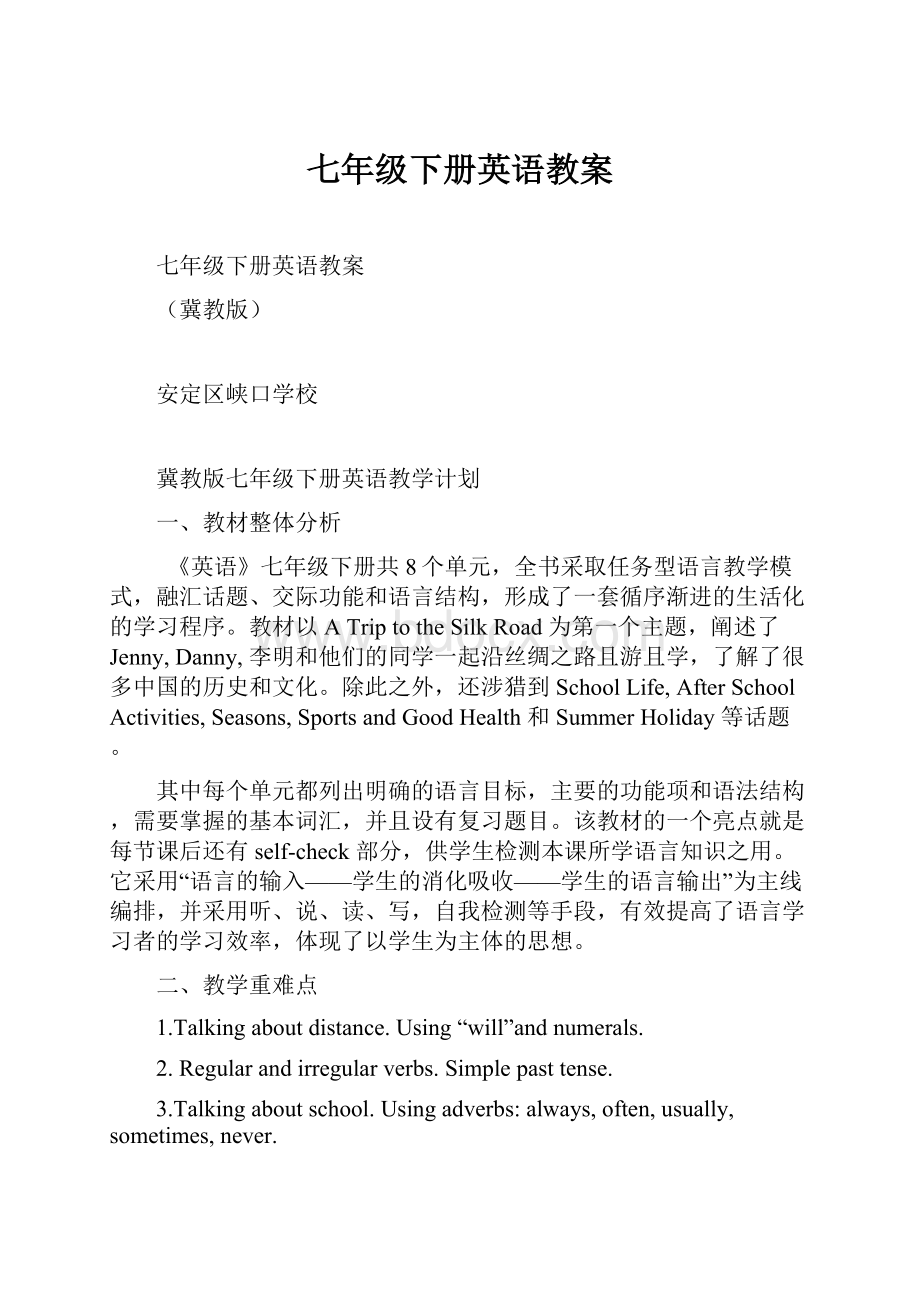七年级下册英语教案Word下载.docx
《七年级下册英语教案Word下载.docx》由会员分享,可在线阅读,更多相关《七年级下册英语教案Word下载.docx(158页珍藏版)》请在冰豆网上搜索。

2、基本的语法教学一定要与语境相结合。
进行语法操练时,要坚持“四位一体”,即话题、语境、结构、功能相结合。
抓住话题,联系语境,确定语法结构,明确语法功能。
3、加强交际用语教学。
在教学语言功能项目时,要尽量避免格式化,不要限制学生的思维能力,要培养学生灵活运用语言的应变能力。
4、进一步培养阅读能力。
阅读能力的培养在于平时。
教师在平时讲解阅读理解题时,应着力帮助学生分析语言材料,而不是核对答案。
5、听说领先,读写跟上,综合训练,扎实双基。
2012—2013学年度第二学期七年级英语教学进度表
周次
日期
教学内容
课时
1
2.25—3.3
Lesson1—Lesson3
3
2
3.4—3.10
Lesson4—Lesson6
3.11—3.17
Lesson7—Lesson9
4
3.18—3.24
Lesson10—Lesson12
5
3.25—3.31
Lesson13—Lesson15
6
4.1—4.7
Lesson16—Lesson18
7
4.8—4.14
Lesson19—Lesson21
8
4.15—4.21
Lesson22—Lesson24
9
4.22—4.28
Revision
10
4.29—5.5
MiddleExamination
11
5.6—5.12
Lesson25—Lesson27
12
5.13—5.19
Lesson28—Lesson30
13
5.20—5.26
Lesson31—Lesson33
14
5.27—6.2
Lesson34—Lesson36
15
6.3—6.9
Lesson37—Lesson39
16
6.10—6.16
Lesson40—Lesson42
17
6.17—6.23
Lesson43—Lesson45
18
6.24—6.30
Lesson46—Lesson48
19
7.1—7.7
20
7.8—7.14
FinalExamination
学段:
初中
年级:
七年级
学科:
英语
单元:
第一单元
课题:
AtriptotheSilkRoad
课型:
新授课
主备学校:
主备人:
初审人:
终审人:
合作团队:
Lesson1AtriptoChina
.Learningaims
Keyvocabulary:
tripsilkroadleadnotechancesendnews
Keyphrases:
learnabout(学习,了解);
learn(…)from…(向……学习……、从……获得……知识);
learntodosth.(学习做某事)
sendsb.sth.=sendsth.tosb.(把某物寄给某人)
tellsb.sth.=tellsth.tosb.(告诉某人某事)
thinkabout(考虑、认为)
Keystructures:
Whatdoes\dosb.thinkaboutsth.?
Practicelistening、speaking、readingandwritingskills.
.Learningimportantpoints
WearelearningabouttheSilkRoadthismonthinschool.
这个月我们正在学校学习丝绸之路。
(1).learnabout学习、了解
(2).learn(…)from…(向……学习……、从……获得……知识)
(3).learntodosth.学习做某事
learntoswim学习游泳learntorideabike学习骑自行车
(4).theSilkRoad
2.Mumanddad,mayIaskyouaquestion?
爸爸妈妈,我可以问你们一个问题吗?
MayI…?
此句式表达有礼貌地请求对方允许,语气十分委婉,还可以表达为:
CouldI\CanI?
其肯定回答常用:
Yes.可以。
\Sure.\Certainly.当然可以。
否定回答为:
I`msorry,youcan`t.抱歉,不行。
\I`msorry,but…抱歉,但……\You`dbetternot.你最好别这样。
3.Whowillleadthetrip?
lead用作及物动词,意为“带领、指路”。
其过去式led,名词为leader(l领导者、领先者)。
4.Hereisthenotefrommyschool.这是我们学校的信笺。
note用作可数名词,意为“信笺、笔记”。
(1).make\takenotes意为“做笔记”。
(2).leavesb.anote意为“给某人留便条”。
5.IwillsendLiMingane-mailandtellhimthegoodnews.
我将给李明发电子邮件,告诉他这个好消息。
(1).send及物动词,“寄,送”,过去式为sent。
sendsb.sth.=sendsth.tosb.意为“把某物寄给某人”
(2).tellsb.sth.=tellsth.tosb.意为“告诉某人某事”
6.WhatdoesMrs.Smiththinkaboutthetrip?
史密斯夫人认为这次旅行怎么样?
thinkabout意为“考虑,认为”
7.Thisisagoodchanceforyou.对你来说这是一次很好的机会。
chance用作可数名词,意为“机会、运气”。
.Learningdifficultpoints
1.MyschoolisplaningatriparoundChinawithLiMing`sschool.
(1).trip用作可数名词,意为“旅行、旅程”,通常指短距离的旅行。
trip名词,一般用语,侧重于“短途旅行”。
travel名词,泛指旅行的过程
(2).around用作介词,意为“遍及、全”,后跟表示地点的名词,aroundChina意为“中国各地”,相当于alloverChina。
2.SomestudentsfrommyclasswillgotoChinaandtravelontheSilkRoad.
我班里的一些学生会去中国,在丝绸之路上旅行。
本句是一般将来时,一般将来时用于描述将要发生的动作或存在的状态。
它的基本结构是“will+动词原形”。
Wewillgetthereontime.
will结构的句式变化是:
肯定句
主语+will+动词原形+其他
否定句
主语+willnot\won`t+动词原形+其他
一般
疑问句
Will+主语+动词原形+其他?
肯定答语:
Yes,主语+will.
否定答语:
No,主语+won`t.
特殊
特殊疑问句+will+主语+动词原形+其他?
例如:
ShewilljointheEnglishclub.
Shewon`tjointheEnglishclub.
WillshejointheEnglishclub?
Yes,shewill.
No,shewon`t.
Wherewillshego?
3.IwillsendLiMingane-mailandtellhimthegoodnews.
我会给李明发一份电子邮件,告诉他这个好消息。
news是不可数名词,意为“新闻、消息”。
可用piece表示其数量,例如:
“一则新闻”apieceofnews。
“两则新闻”twopiecesofnews。
.LearningGuide
.AutonomicLearning
1.Reviewandlearnthenew.
(1).Fillintheblanksandlearnthekeyvocabulary.
Youwillhaveagood____(旅行).
Myfatheriswearinga____(丝绸)shirt.
Therearesomecarsandbusesonthe____(公路).
Don`tworry.Iwill____(带路)thewayforyou.
Thatwillbeagood____(机会)foryou.Don`tmissit.
Isthereany____(新闻)inthenewspaper?
Let`s____(送)abirthdaycardtohim.
Theyaretaking____(笔记)inclass.
(2).Translationandlearnthekeyphrasesandstructures.
今天晚上我会去看电影。
猜怎么着!
这个月我们在学校学习有关丝绸之路方面的知识。
我会发一份电子邮件给李明,告诉他这个好消息。
你知道那则新闻吗?
(3).Listenandwritetrueorfalseinordertoknowmoreaboutthelesson.
JennyislearningabouttheSilkRoadthismonthinschool.()
LiMing`sschoolisplaningatriptoCanada.()
Ms.MartinwillgotoChinawiththestudents.()
2.Readingmethods
(1).Fullymasterthemeaningofthekeyvocabulary、phrasesandstructuresgiveninlesson1.
(2).Explainthedifficultpointsappearedinlesson1.
3.Studyandreadintensively
(1).Usethekeystructuresofeveryparagraphtoreadeffectively.
(2).Obstaclejumpmethod.Ifyoumeetdifficultproblemsintheprocessofreading,youcanputthemasidetodealwithnewknowledge.Afterthat,youcanconcentrateyourattentiononthatdifficultproblems.
(3).Seize“keypoints”.Itcanbeeffectivetocomprehendthecontentandimplicationsofanessaythoroughlythroughanalysisandconsiderationofkeypoints.
.Dispelsuspicionusingmutualhelp.
1.WearelearningabouttheSilkRoadthismonthinschool.
IwanttolearnaboutthehistoryofChina.
Wemustlearnfromeachother.
(4).theSilkRoad丝绸之路the是定冠词,此处用在由普通名词组成的专有名词前。
theGreatWall长城theSummerPalace颐和园
Theroadleadsyoutothepostoffice.
lead还可用作不及物动词。
Youlead,andI`llfollow.
Weshouldmake\takenotescarefullyinclass.
Helefthissonanoteonthetable.
Myfriendoftensendsmebooks.
Iwilltellhimmyname.
thinkabout意为“考虑,认为”,about是介词,后可跟名词、代词或v.-ing形式。
WhatdoyouthinkaboutSpotsWeekly?
haveachancetodosth.=haveachanceofdoingsth.意为“有机会做某事”,bychance意为“偶然地”。
It`sagoodchancetolearnfromworkers.
8.MyschoolisplaningatriparoundChinawithLiMing`sschool.
Wewillmakeatriptotheseaside.
Haveagoodtrip.
HewantstomakeatriptotheGreatWall.
Peoplearoundtheworldlovepeace.
9.SomestudentsfrommyclasswillgotoChinaandtravelontheSilkRoad.
10.IwillsendLiMingane-mailandtellhimthegoodnews.
Doyouknowthenewsaboutthefire?
.Inquiriesandsuggestions.
1.WhatisJenny`sschoolplaning?
2.Whowillleadthetrip?
3.WhatdoesMrs.Smiththinkaboutthetrip?
4.WhywillJennysendLiMingane-mail?
5.WhatisJennylearningaboutthismonthinschool?
.Groupwork.
Setansituationandaskthestudentstomaketheirownconversationsingroupsandactthemout.
.Expandandimprove.
1.IhopeTimcancometomybirthdayparty.Thenwe____amuchhappiertime.
A.haveB.hadC.willhaveD.havehad
2.Letmetellyou____newsaboutcellphones(手机).
A.AB.manyC.someD.few
3.Please_____thisbook_____myteacher.
A.send;
toB.give;
\C.send;
forD.give;
for
4.What____hethink____thetrip?
A.do;
\B.does;
\C.does;
aboutD.do;
about
5.--Doyouhaveanyplansforyourwintervacations?
--I____forHainannextSunday.
A.leaveB.willleaveC.leavingD.left
.Finishthetask.
1.Fillintheblankswiththelearndwords.
(1).Iplantogoona____toBeijingthissummer.
(2).Ihavesomegood____foryou.
(3).Ma